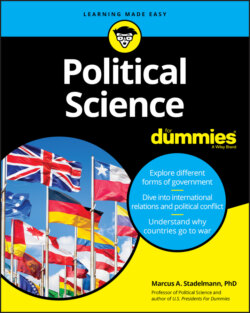Читать книгу Political Science For Dummies - Marcus A. Stadelmann - Страница 31
Starting with Traditionalism
ОглавлениеNot surprisingly, political scientists in the late 19th century to the 1940s were more like the historians of the day. They picked similar problems to study and used similar techniques to study them. This methodological period is called traditionalism. When using the traditionalist approach, while researching a problem, political scientists would engage in the following activities:
Description: Traditionalist political scientists were descriptive in nature. They described structures and their features in detail instead of trying to explain.For example, when looking at a legislature, such as the U.S. Congress, political scientists described its structures and functions. They discussed in detail the powers given to Congress by the constitution, the way Congress passed bills, and how many committees both Houses of Congress had. In addition, they described electoral laws for countries and how people could run for office. When looking at the U.S. Constitution, political scientists would detail the powers given to all three branches of governments and the relationship between the federal government and states. There was no analysis of how Congress actually worked and how and why members of Congress voted on certain bills.
Formal legalism: Formal legalism refers to traditionalists studying formal structures such as political institutions, examples being legislatures and executives, and focusing on written documents such as constitutions. Traditionalists excluded studying human beings working in these institutions on purpose. In other words, they needed to discuss the structures but ignored the people working in these structures.
Normative theory: Normative theory is an explanation of events and people’s behavior, which includes a researcher’s personal preferences. Instead of being neutral, under this theory, it’s perfectly acceptable to include values, personal preferences, and personal beliefs into research. After creating a normative theory, it isn’t necessary to test it. A great example of traditional research and normative theory comes from American politics. It’s called the Classical Democratic Theory of Voting Behavior and was widely accepted until the1940s. It goes as follows:In a democracy, voters are rational voters.Voters know about issues and candidates’ stances on issues and are able to base their votes on issues and candidate preferences.Voters cast a vote based on knowledge.This is considered a rational vote.Because democracies create these rational voters and the U.S. is a democracy, rational voters exist in the U.S.
Conservativism and the status quo: Political scientists who identified as traditionalists wrote in support of their governments or political regimes. For traditionalists, it was unacceptable to criticize their current government. They did research to support the current regime. Do keep in mind that many political scientists of the time conducted their work in authoritarian regimes (see Chapter 4) and couldn’t, even if they wanted to, publicly criticize their government. Imperial Germany (1871–1918) is a good example of this.
Eurocentrism: Most traditionalists were Eurocentric. All that means is that they focused their work on Europe. And for research purposes, this included the U.S., which was considered European because it was populated by Europeans. The rest of world was colonized and didn’t matter much to political scientists. This didn’t change until the end of World War II, which resulted in the decolonization of most of the world, especially Africa and Asia.
Begin parochial: Most traditionalists believed that the European races were superior to other races found especially in Africa. Political scientists and historians in France, for example, focused on the moral obligation to spread the superior French culture to its African colonies to educate and improve local culture. The inequality of races was one of the most controversial aspects of traditionalism and disappeared from political science research after World War II.
Traditionalism dominated political science for almost a century but started to decline in the 1940s. More and more political scientists felt uncomfortable with its Eurocentric and conservative orientations. Most important, political scientists conducted new empirical studies, which undermined traditionalist theories.
